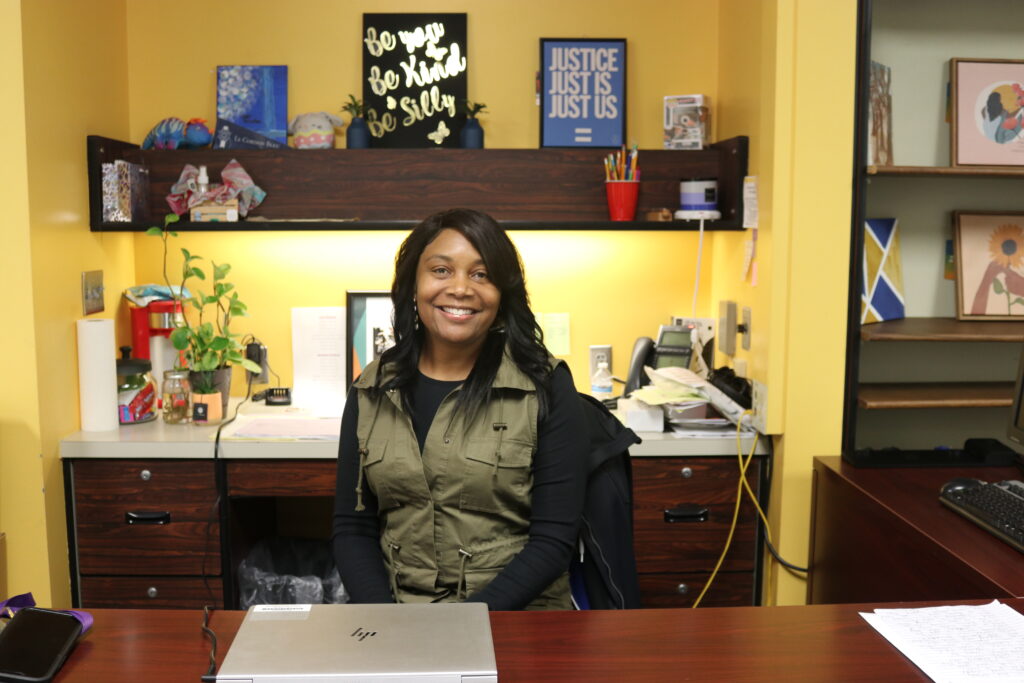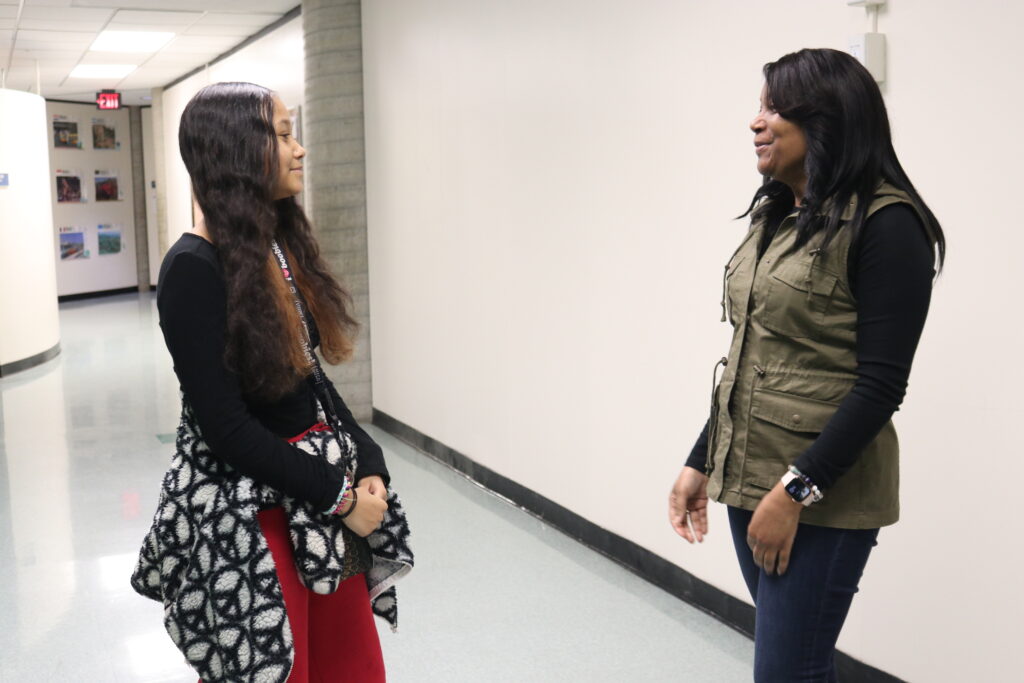
KimEl Henry can be found walking the halls of Andersen United Middle School in Minneapolis every day with an important task—making sure every student feels respected, seen and heard.
As the restorative practices and dean team lead, Henry’s job is to work with scholars and staff in restorative circles and facilitate mediations to help everyone repair harm when needed, and to build relationships. Henry also helps staff, scholars and families learn about and understand the importance of restorative practices versus punitive measures.
The dedication Henry puts into this work is a big part of why she was named Education Minnesota’s 2022-23 Education Support Professional of the Year.
Henry has been working in Minneapolis Public Schools for 20 years. She has been a youth coordinator, associate educator and has been in her current role for more than two years.
Education is not something Henry pursued as a career originally, but after her family pushed her to try it, she found her calling.
“I wanted to go to culinary school and own my own restaurant,” said Henry. “My aunt worked in Minneapolis Public Schools for 33 years and my mom, who also was in education, encouraged me to try it. And once I got here, I knew this is where I am supposed to be.”
Henry did also complete culinary school and does catering as a second job.
Henry also didn’t seek out her role as restorative practices lead, but it was another opportunity that found her.
“I was already doing the work,” she said. “Then the opportunities came up to be a dean team lead and now restorative practices and dean team lead and people identified me as someone already working in these areas to take on the role.”
Henry’s main focus is the scholars, she says, but she also works to help the staff and administration in creating welcoming and supportive environments where the kids stay in the buildings as much as possible.

“Working with the kids, it’s about hearing their story and helping them advocate for their voice,” she said. “Sometimes they are left unheard and that’s not OK. When we ask questions of them, we can get the information we need and let them be heard in a comfortable way.”
If something were to happen in her building, Henry helps do an investigation. She helps do interviews and get statements and stories from those involved and who witnessed it.
“Then we look at where we can fix and repair harm,” she said. “Do we do a circle? Do we do mediation? Is there a way to keep the kids in school? When we’re talking it out, a person is less likely to quickly say a student should be suspended.”
These programs were especially important as Andersen recently transitioned from a K-8 school to a 6-8 middle school.
“Ms. Henry’s leadership developed our systems of support for behavior at the macro level,” said Teresa Gloppen, an eighth-grade teacher at Andersen, in a nomination letter for this award. “Her consistency has created a behavioral system that moves beyond punitive consequences and truly seeks to teach and restore. She collaborates with teachers, staff, administration and families in order to create an environment that encourages all students to reflect and learn.”
Keeping a focus on supportive relationships over punitive punishments is key to Henry’s work.
“Building relationships is what makes this work,” Henry said. “We need buy-in for this important work to work. And people in our school really understand the importance.”
Henry sees those relationships also impacting student success in school.
“It is also helping students learn the importance of building relationships in a kind, welcoming way and taking time out to breathe before they reflect on an issue that is bothering them,” she said. “I also work on breathing exercises with them to show them that it’s okay to pause and breathe before they react. As a result, not only are scholars more likely to have better relationships, they are also less likely to engage in physical and verbal altercations that would have resulted in them spending time out of the classroom.”
Henry is trained in mindfulness, which she employs throughout her work to maintain supportive learning and working environments for all scholars and staff, including herself.
“Learning about mindfulness and self-care and practicing it every day has made a difference in the way I am able to be present for staff, scholars and their families, especially since much of my day is spent with people who are going through a difficult time,” Henry said, as part of her award portfolio essays.
Supporting ESPs across the district, especially those who do the behavioral support work and staff of color, has been an important aspect of Henry’s work and advocacy.
“ESPs who provide behavior support as a part of student support teams are often high-turnover positions,” Henry said. “I am proud of the team that I have led for the past few years because we have several ESPs on our team that have been on the team for many years. The work that my team of ESPs provides at Andersen is respected and highlights the importance of our oftentimes difficult job. Something that is very important to me is ensuring that our scholars and families feel like they belong. That is why I have regularly advocated for hiring more staff that represent our student population.”
Henry went on strike last spring as a member of the Minneapolis Federation of Teachers and Education Support Professionals.
“We really became a community during the strike,” she said. “We had staff teams before, but we were a whole school community during the strike and it was so beautiful.”
Henry says the fight for additional compensation and stability for ESPs and the staff of color retention were important pieces for her on the strike lines.
“Kids need the support and they need to see themselves represented in the educators working with them,” she said.
Henry’s impact on her students is not only recognized by receiving this award, but is seen and felt throughout the district.
“One thing has stayed constant—the endless love she has for her students, their families and the Andersen community as a whole,” said Adam Love, Minneapolis Public Schools equity and school climate coordinator. “Henry’s commitment, passion and care is without a doubt second to none.”
Henry now becomes Education Minnesota’s nominee to the National Education Association’s ESP of the Year award. She receives $1,200, an iPad courtesy of Education Minnesota ESI and an all-expense paid trip to the NEA’s ESP professional development conference.


